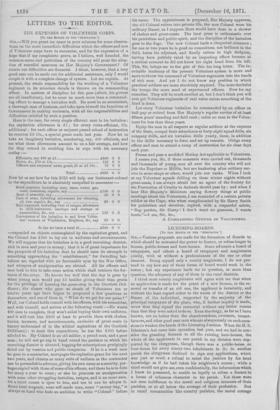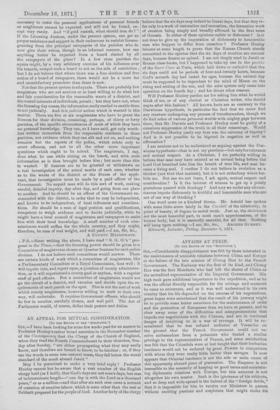LICENSING-BOARDS.
[TO THR EDITOR OF THE "SPEOTA.TOR.-] Sin,—Various proposals are made for the formation of Boards to which should be entrusted the power to licence, or refuse longer to license, public-houses and beer-bouses. Some advocate a board of ratepayera, and others a board of ratepayers and magistrates jointly, with or without a predominance of the one or other element. Being myself only a county magistrate, I do not pre- tend to say how any of those forms of board would work in the towns ; but my experience leads me to question, or more than question, the adequacy of any of them in the rural districts.
I think most county magistrates will agree with me that when an application is made for the grant of a new licence, or the re- newal or transfer of an old one, the applicant is invariably, and without the least regard either to the wants of the district or the fitness of the individual, supported by the majority of the principal ratepayers of the place, who, if farther inquiry is made, avow that they signed the memorial without any better reason than that they were asked to do so. Even the clergy, as far as I have known, are no better than the churchwardens, overseers, tenant- farmers, and other good easy men whoare always ready on such occa- sions to weaken the hands of the Licensing Justices. 'When Sir H. S. Ibbetson's Act came into operation last year, and we had to con- sider the granting licences to all the existing beer-houses, the whole of the applicants in one parish in my division were sup- ported by the clergyman, though there was a public-house or beer-house for every ninety-two inhabitants in it; in another parish the clergyman declined to sign any applications, which was just as much a refusal to assist the justices by his local knowledge as if he had taken his neighbour's course ; while a third would not give me, even confidentially, the information which I knew he possessed, to enable us legally to refuse a licence to a house of infamous character in his parish. Yet these were not men indifferent to the moral and religious interests of their
parishes, or at all below the average of their profession. But in small communities like country parishes, the moral courage
necessary to resist the personal applications of personal friends or neighbours cannot be expected, and will not be found, ex- cept very rarely. And " if gold rustoth, what should iron do ? " If the Licensing Justices, under the present system, can get no proper assistance and support in their endeavour to restrict licence- 'granting from the principal ratepayers of the parishes who do now give their voices, though in an informal manner, how can anything better be expected from a board elected by all the ratepayers of the place ? In a few close parishes the 'squire might, by a very arbitrary exercise of his influence over his tenants, compel such a board to act on the side of restriction ; but I do not believe that where there was a free election and free action of a board of ratepayers, there would not be a more lax .and unsatisfactory procedure than there is now.
Not that the present system is adequate. There are probably few (magistrate who aro not anxious or at least willing to do what law and fair consideration for the reasonable wants of a district, and the vested interests of individuals, permit ; but they have not, when the licensing day comes, the information really needed to enable them to act judicially. And it is judicial action which is wanted in this matter. There are five or six magistrates who have to grant the licences for their division, consisting, perhaps, of thirty or forty parishes, of the specific circumstances of most of which they have no personal knowledge. They can, as I have said, get only worth- less written memorials from the respectable residents in those parishes, not evidence which they can sift and act on, and nothing remains but the reports of the police, which relate only to overt offences, and not to all the other more important questions which ought to be solved. The magistrate, I say, does what he can while sitting on the bench, and with such ;information as is then brought before him ; but more than this is wanted. If licences are to be granted or withdrawn on a real investigation of the actual merits of each case, whether as to the wants of the district or the fitness of the appli- cant, that investigation must be made by a paid officer of the Government. No unpaid man will do this sort of work, making careful, detailed inquiry, day after day, and going from one place to another. And he should be an officer of the Government un- connected with the district, in order that he may be independent, and known to be independent, of local influences and considera- tions. He should be a man of legal position and qualifications, competent to weigh evidence and to decide judicially, while he might have a local couucil of magistrates and ratepayers to assist him with their local knowledge. A small number of such com- missioners would suffice for the whole country, and they might, therefore, be men of real weight, and well paid.--I am, Sir, &c., A COUNTY MAO1STJRA'FE.
P.S.—Since writing the above, I have read " S. G. 0.'s " pro- posal in the Times,—that the licensing power should be given to a Committee of magistrates chosen at Quarter Sessions for each police division. I do not believe such committees would answer. There lare certain kinds of work which a committee of magistrates, like a Parliamentary Committee or a Royal Commission, does well ; it will inquire into, and report upon, a question of county administra- tion, or it will superintend a county gaol or asylum, with a regular staff of paid officers. But a. committee of magistrates would not ego the circuit of a district, and examine and decide upon the re- quirements of each parish on the spot. This is not the sort of work which county magistrates, however willing to work in their own way, will undertake. It requires Government officers, who should 'be few in number, carefully chosen, and well paid. The Act of Parliament would, of course, define their powers and duties.











































 Previous page
Previous page